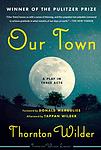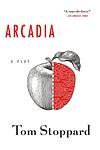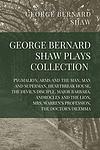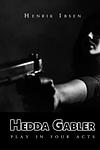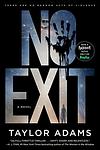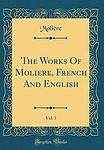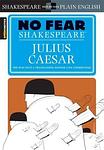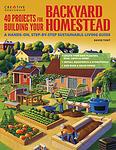The Greatest "Plays" Books of All Time
Click to learn how this list is calculated.
This list represents a comprehensive and trusted collection of the greatest books. Developed through a specialized algorithm, it brings together 305 'best of' book lists to form a definitive guide to the world's most acclaimed books. For those interested in how these books are chosen, additional details can be found on the rankings page.
Genres
Plays are a category of literature that consists of written works intended for performance on stage. They typically feature dialogue between characters and are structured into acts and scenes. Plays can be comedic, tragic, or a combination of both, and often explore themes such as love, power, and morality. They are meant to be performed by actors in front of an audience, and can be enjoyed both as written works and as live performances.
Countries
Date Range
Reading Statistics
Click the button below to see how many of these books you've read!
Download
If you're interested in downloading this list as a CSV file for use in a spreadsheet application, you can easily do so by clicking the button below. Please note that to ensure a manageable file size and faster download, the CSV will include details for only the first 500 books.
Download-
51. Mourning Becomes Electra by Eugene O'Neill
"Mourning Becomes Electra" is a trilogy of plays that retells the Oresteia story of the House of Atreus in a modern American setting. The narrative explores the themes of revenge, obsession, and guilt within the Mannon family, who are haunted by a dark, cursed past. The plot follows the aftermath of the American Civil War, with the characters struggling to escape their tragic fate, ultimately leading to their downfall.
The 1243rd Greatest Book of All Time -
52. Endgame by Samuel Beckett
Endgame is a one-act play that follows the lives of Hamm, a blind and unable to stand man, and Clov, his servant who cannot sit. They live in a single room, with Hamm's legless parents residing in dustbins. The characters are trapped in a cyclical existence where they constantly argue and contemplate life, death, and their own existence. The play is characterized by its minimalistic setting and bleak outlook on life, reflecting themes of existentialism and the human condition.
The 1281st Greatest Book of All Time -
53. Rosencrantz & Guildenstern Are Dead by Tom Stoppard
The play is an absurdist, existential tragicomedy that follows two minor characters from Shakespeare's "Hamlet," Rosencrantz and Guildenstern, who are now the protagonists in their own story. As they stumble through philosophical debates and encounter a troupe of actors while trying to understand the nature of reality and their own existence, they find themselves increasingly out of their depth in a world where they have little control over their fate. The narrative weaves in and out of events from "Hamlet," offering a humorous and poignant perspective on free will, chance, and the search for meaning in a seemingly indifferent universe.
The 1323rd Greatest Book of All Time -
54. Our Town by Thornton Wilder
This play is a poignant depiction of life in a small American town called Grover's Corners, New Hampshire, at the turn of the 20th century. Through the everyday lives of its citizens, the narrative explores universal themes of love, marriage, mortality, and the passage of time. The story is narrated by a stage manager who directly addresses the audience and interacts with the characters, guiding viewers through the experiences of two families, the Gibbs and the Webbs. The play's minimalist staging and meta-theatrical elements emphasize the ephemeral nature of human existence, encouraging the audience to appreciate the beauty of life's ordinary moments.
The 1376th Greatest Book of All Time -
55. The Iceman Cometh by Eugene O'Neill
"The Iceman Cometh" is a play set in a New York City bar in 1912, featuring a group of down-and-out alcoholics who spend their days in a state of drunken stupor, telling tall tales and dreaming of better futures. The arrival of a former patron, now sober, disrupts their routine as he insists on forcing them to face the harsh realities of their lives and abandon their delusions. The play is a poignant exploration of despair, disillusionment, and the human capacity for self-deception.
The 1399th Greatest Book of All Time -
56. Arcadia by Tom Stoppard
"Arcadia" is a play that intertwines two timelines, set in the same English country house but centuries apart. In the early 19th century, a gifted young girl and her tutor delve into intellectual pursuits, exploring mathematics, nature, and the early inklings of chaos theory, while around them, the adults engage in witty repartee, romantic entanglements, and poetic rivalries. In the present day, scholars and descendants of the house's historical residents attempt to piece together the past, often misinterpreting the evidence they find. The play explores themes of time, truth, and the impact of the past on the present, all while showcasing the enduring nature of human curiosity and the quest for knowledge.
The 1432nd Greatest Book of All Time -
57. Selected Plays of George Bernard Shaw by George Bernard Shaw
This collection features selected plays by a renowned playwright, showcasing his wit, social criticism, and talent for character development. The plays touch on a wide range of themes, including class struggles, the complexities of love, the absurdity of war, and the pursuit of individual freedom. The author's sharp dialogue and satirical approach make these plays both entertaining and thought-provoking, reflecting his progressive views and his belief in the potential for societal change.
The 1457th Greatest Book of All Time -
58. The Imaginary Invalid by Molière
The play is a satirical comedy that centers around Argan, a hypochondriac who obsesses over his health and squanders his fortune on unnecessary medical treatments. His ailment is exploited by charlatan doctors and a greedy wife, while his daughter's marital future hangs in the balance due to his misguided intentions. The story unfolds with a clever servant, Toinette, and Argan's brother, Béralde, attempting to open his eyes to the truth of his condition and the deceit around him. Through a series of humorous events, including a mock ceremony, the play critiques the medical profession and the foolishness of those who blindly follow it, ultimately advocating for common sense and true familial love.
The 1468th Greatest Book of All Time -
59. Hedda Gabler by Henrik Ibsen
"Hedda Gabler" is a dramatic play that centers on the life of its titular character, a woman trapped in a loveless marriage with a dull, reliable husband. She is bored with her life and longs for freedom and excitement. Her desire for control and power leads her to manipulate those around her, resulting in tragic consequences. The play explores themes of societal expectations, personal freedom, and the destructive power of boredom.
The 1499th Greatest Book of All Time -
60. The Bald Soprano by Eugène Ionesco
"The Bald Soprano" is a play that explores the absurdity of everyday life through a nonsensical narrative. It revolves around two middle-class English couples, the Smiths and the Martins, who engage in meaningless and repetitive conversations. The play is known for its unconventional structure, lack of plot, and the characters' surreal behavior, which are all used to satirize the banality and futility of routine and social norms. The title refers to a character who is never seen or mentioned again after the opening scene.
The 1565th Greatest Book of All Time -
61. She Stoops to Conquer by Oliver Goldsmith
"She Stoops to Conquer" is a comedic play that revolves around the story of a wealthy countryman, Mr. Hardcastle, who arranges for his daughter, Kate, to meet Charles Marlow, the son of a wealthy Londoner, hoping the pair will marry. However, Marlow is nervous around upper-class women, yet gets along fine with lower-class women. Kate learns of this and pretends to be 'common' to get to know him. The play concludes with Kate revealing her true identity, and Marlow, who is in love by this point, is relieved she's actually of the upper class. The play explores themes of class, courtship, and the deceptive nature of appearances.
The 1598th Greatest Book of All Time -
62. The Seagull by Anton Chekhov
The play revolves around the complex interplay of love, art, and the pursuit of happiness among a group of characters gathered at a Russian country estate. Central to the narrative is a young aspiring playwright, who yearns for the recognition of his art and the love of a woman, an actress infatuated with a successful writer. The story unfolds as these characters grapple with unrequited affections, artistic ambitions, and the crushing weight of societal expectations, leading to a tapestry of human desires, disillusionment, and the search for meaning in life.
The 1613th Greatest Book of All Time -
63. The Misanthrope by Molière
"The Misanthrope" is a satirical play that explores the hypocrisy and corruption of French aristocratic society through the eyes of the protagonist, a man who insists on absolute honesty and despises flattery, insincerity, and social conventions. Despite his disdain for society, he falls in love with a coquette who embodies everything he detests, leading to a series of comedic and dramatic situations. The narrative ultimately emphasizes the importance of balance between truth and courtesy in social interactions.
The 1616th Greatest Book of All Time -
64. No Exit by Jean Paul Sartre
The book is a profound existentialist play that delves into the human psyche and the concept of hell through the experiences of three deceased characters who find themselves trapped together in a mysterious, windowless room. As they engage in intense psychological games and confront the worst aspects of their earthly behaviors, they come to the harrowing realization that their torment comes not from any external punishment, but from each other and the eternal company they are forced to keep. The narrative explores themes of freedom, responsibility, and the often unbearable nature of human existence, encapsulated in the famous line, "Hell is other people."
The 1649th Greatest Book of All Time -
65. Rameau's Nephew by Denis Diderot
"Rameau's Nephew" is a philosophical dialogue that explores themes of morality, societal norms, and the nature of genius. The story revolves around a conversation between a philosopher and a character who is the nephew of a famous musician. The nephew, a freeloader and a parasite, defends his lifestyle by arguing that it is not only acceptable but also necessary in a society where wealth and power determine value. The dialogue delves into the contradictions and ironies of social conventions, challenging traditional notions of virtue, vice, and human nature.
The 1652nd Greatest Book of All Time -
66. The Works of Moliere by Molière
This book is a compilation of the works of a renowned 17th-century French playwright, who is often considered one of the greatest masters of comedy in Western literature. His plays are known for their satirical examination of social norms and human folly, featuring a range of characters from the foolish and the pedantic to the hypocritical and the corrupt. Some of his most famous works included in this collection are "Tartuffe," "The Misanthrope," and "The Imaginary Invalid."
The 1682nd Greatest Book of All Time -
67. Julius Caesar by William Shakespeare
This classic play dramatizes the political and personal machinations surrounding the assassination of a powerful leader. The narrative follows the conspirators' plot, their execution of the plan, and the resulting chaos and war. The themes of ambition, loyalty, and the struggle for power are explored through complex character interactions and memorable soliloquies. The play also examines the consequences of political violence and the unpredictable nature of history.
The 1694th Greatest Book of All Time -
68. Alcestis by Euripides
"Alcestis" is a Greek tragedy that tells the story of a queen who voluntarily chooses to die in place of her husband, the king, when he is fated to die early. The king's friend, Heracles, visits them and, unaware of the queen's death, is offended that he is not being properly entertained. Upon learning the truth, he fights and defeats Death to bring the queen back to life, restoring happiness to the royal household. The play explores themes of love, sacrifice, death, and the power of friendship.
The 1696th Greatest Book of All Time -
69. The Government Inspector by Nikolai Gogol
The play is a satirical comedy that exposes the corruption and foolishness of the bureaucracy in a small Russian town. When officials mistake a lowly civil servant for a feared government inspector traveling incognito, they fall over themselves to cover up their town's numerous misdeeds. The visitor exploits the situation for personal gain, accepting bribes and enjoying the sycophantic hospitality of the town's officials, who are oblivious to his true identity. The story unfolds with a series of comedic misunderstandings and ironic twists, culminating in a final revelation that leaves the townspeople facing the consequences of their deception and moral laxity.
The 1715th Greatest Book of All Time -
70. Mother Courage and Her Children by Bertolt Brecht
Set against the backdrop of the Thirty Years' War, the book tells the story of a canteen woman, Mother Courage, who pulls her cart with her three children across war-torn Europe. It explores her struggles and survival tactics as she tries to profit from the war while keeping her children safe. The narrative is a profound critique of war and its consequences, highlighting the human cost of conflict and the often futile search for prosperity and security in a chaotic world.
The 1735th Greatest Book of All Time -
71. The Resistible Rise of Arturo Ui by Bertolt Brecht
"The Resistible Rise of Arturo Ui" is a satirical play that uses the rise of a fictional 1930s Chicago mobster, Arturo Ui, to parallel the rise of Adolf Hitler in Nazi Germany. The narrative is a critique of those who allowed Hitler to come to power, emphasizing that his rise was indeed resistible. The play explores themes of power, corruption, manipulation, and the dangers of complacency, showcasing the destructive potential of unchecked ambition and the failure of society to prevent the ascent of dangerous individuals.
The 1739th Greatest Book of All Time -
72. Rhinoceros and Other Plays by Eugène Ionesco
"Rhinoceros and Other Plays" is a collection of three absurdist dramas that explore themes of conformity, culture, and mass movements. The titular play depicts a small French town where the inhabitants inexplicably transform into rhinoceroses, symbolizing the rise of fascism and the dangers of conformity. The other two plays, "The Leader" and "The Future is in Eggs," continue to explore these themes through a satirical and often surreal lens, challenging societal norms and the nature of reality itself.
The 1742nd Greatest Book of All Time -
73. The Tragical History of Doctor Faustus by Christopher Marlowe
This classic work of literature revolves around the character of Doctor Faustus, a scholar who is dissatisfied with traditional forms of knowledge and yearns for more. In his quest for ultimate power and understanding, he makes a deal with the devil, selling his soul in exchange for 24 years of service from the devil's agent, Mephistopheles. Despite the pleasures and knowledge he gains, Faustus eventually regrets his deal as he faces eternal damnation, symbolizing the human struggle between ambition and morality.
The 1800th Greatest Book of All Time -
74. Le Cid by Pierre Corneille
"Le Cid" is a dramatic play that follows the story of a young nobleman who is torn between love and honor. The protagonist is faced with a dilemma when he is ordered to kill his beloved's father in a duel to defend his own father's honor. Despite his love for his girlfriend, he chooses honor over love and kills her father, leading to a series of tragic events. The play explores themes of duty, honor, and the moral complexities of revenge.
The 1808th Greatest Book of All Time -
75. Fences by August Wilson
The play explores the life of an African American family in the 1950s, focusing on the complex relationships between a father, who once aspired to be a professional baseball player but was thwarted by racial discrimination, and his family. The father's bitterness and frustrations over his unfulfilled dreams and the racial barriers of his time manifest in his relationships with his sons, who have their own hopes and ambitions. The narrative delves into themes of generational conflict, racial inequality, and the struggle for personal fulfillment, all symbolized by the fence the father builds around his yard, which serves as a metaphor for both division and protection.
The 1838th Greatest Book of All Time
Reading Statistics
Click the button below to see how many of these books you've read!
Download
If you're interested in downloading this list as a CSV file for use in a spreadsheet application, you can easily do so by clicking the button below. Please note that to ensure a manageable file size and faster download, the CSV will include details for only the first 500 books.
Download


